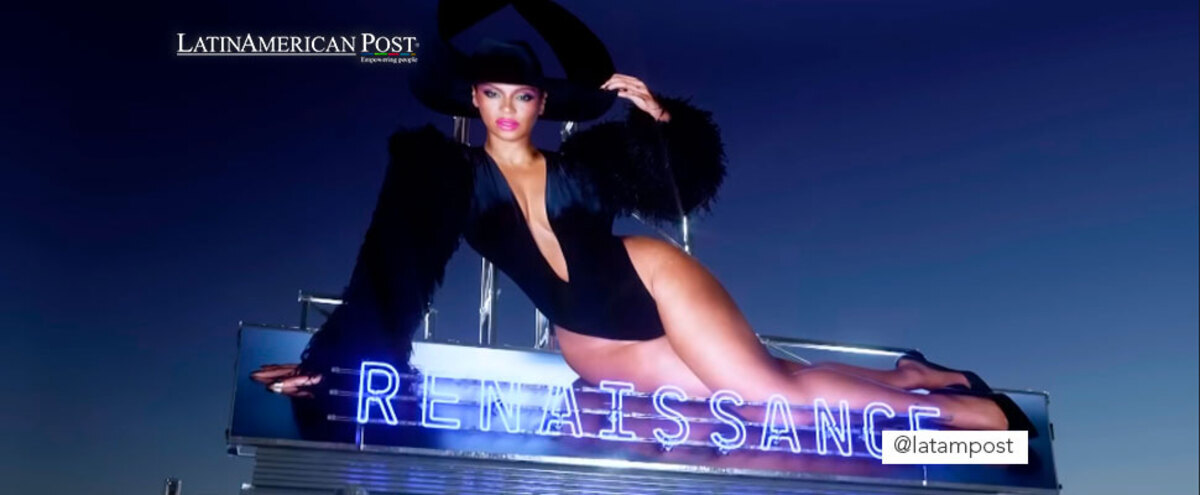“Renaissance” Review: Beyoncé’s Ode to Joy
If there is someone who knows about being reborn, that is Beyoncé. After 6 years of waiting, the singer celebrates her life and that of black women by relying on ballroom culture. This is our "Renaissance" review .

Photo: YT-Beyonce
LatinAmerican Post | Julián Gómez
Listen to this article
Leer en español: Reseña de “Renaissance”: Oda de Beyoncé a la alegría
After two years living with COVID-19, there was a word that was worn out and that was “reinvent yourself”. However, there is no better word to describe "Renaissance," Beyoncé's seventh studio album.
Beyoncé's reinvention is so high that 'I'm That Girl', the song that opens the album, does not have a musical or conceptual transition with "Lemonade" 2016 -her previous album-, but there is an abrupt cut. The song moves from an aggressive sampling close to the bounce of the American South to a much more Caribbean dembow . The aggressiveness of the sample, the relaxing cadence of the dembow and the delicate voice of Beyoncé play with the listener in a highly complex creative contrast. This is how the album unfolds, with unexpected paths and almost unprecedented formulas.
“Creating this album allowed me a place to dream and find an escape during a dark time for the world. It allowed me to break free and be adventurous in a time that moved little. My intention was to create a safe place, a place without judgement. A place to be free from perfection and reflection,” Beyoncé said. The album cover is an image with her (half-naked) on a sparkly horse.
According to her, "Renaissance" will be the first of three acts she will deliver. The name is linked to a new era that is going through its 40 years. “Lemonade” had many moments of mourning and some ballads, which are conspicuous by their absence in their new project.
To say that this album is a Beyoncé comeback is perhaps an exaggeration. Between "Lemonade" and "Renaissance'" there was a live album in 2019 ("Homecoming: The Live Album"), a collaboration album with Jay-Z in 2018 ("Everything Is Love") and a soundtrack in 2018 ("The Lion King: The Gift"). Perhaps from the conceptual point of view, there is a notable creative detachment with these mentioned works.
Clearly, Beyoncé's main source of inspiration is the disco music of the late '70s and early '80s. That mixes it with a more modern sound palette that draws from rap, trap, afrobeats, funk, house, neosoul, and electronics.
The proposal of "Renaissance" is raised by Beyoncé from the cover. The horse she dominates is visibly charged with energy, and that is what the disc reflects. She is in charge of managing that energy throughout the 16 songs and decides when to release more or less energy to avoid the weariness of the listener. In short, it is an invitation to go out on the dance floor and put aside the many problems of the environment and introspection: dedicate ourselves to being happy for a moment.
Read also: Lollapalooza 2022: A Massive Hit For The Chicago Festival
Ballroom Influence
Those who have seen the 'Pose' series will think that this album would work perfectly as a soundtrack. The series represents the Afro and Latino New York trans community at the end of the 1980s, which, with the impulse of vogue, gave birth to the ballroom, a series of contests in various categories of dance, aesthetics, and fashion. These shows served to unite a community that was enduring -paradoxically- another pandemic such as that of HIV. “Pure/Honey", "Heated" and "Summer Renaissance" would be perfect songs to dance vogue from that era.
Beyoncé not only pays homage from a conceptual point of view, but musically, in "Break My Soul" she includes Big Freddia, a trans artist who sings bounce. Also, she includes Honey Redmond, a trans dj who produces "Cozy", the second song on the album. In addition, the recognition of the LGBTIQ+ community does not stop there, but goes as far as a dedication on the physical CD addressed to Johnny, his gay uncle who passed away a few years ago.
Contrary to what many artists did in their first job during the pandemic, after a long time, which was to dedicate themselves to introspection as happened with Kendrick Lamar to name a few, Beyoncé felt that it was time to celebrate and focus on joy. . Likewise, it adds a touch of sexual mischief, without neglecting its political struggles, which in this case are the empowerment of black women and the LGBTIQ+ community.




